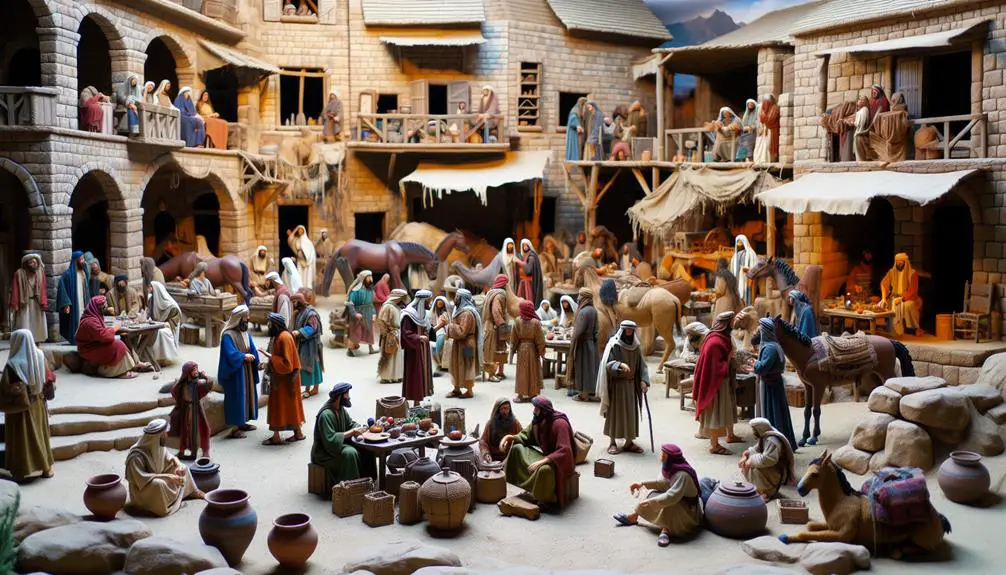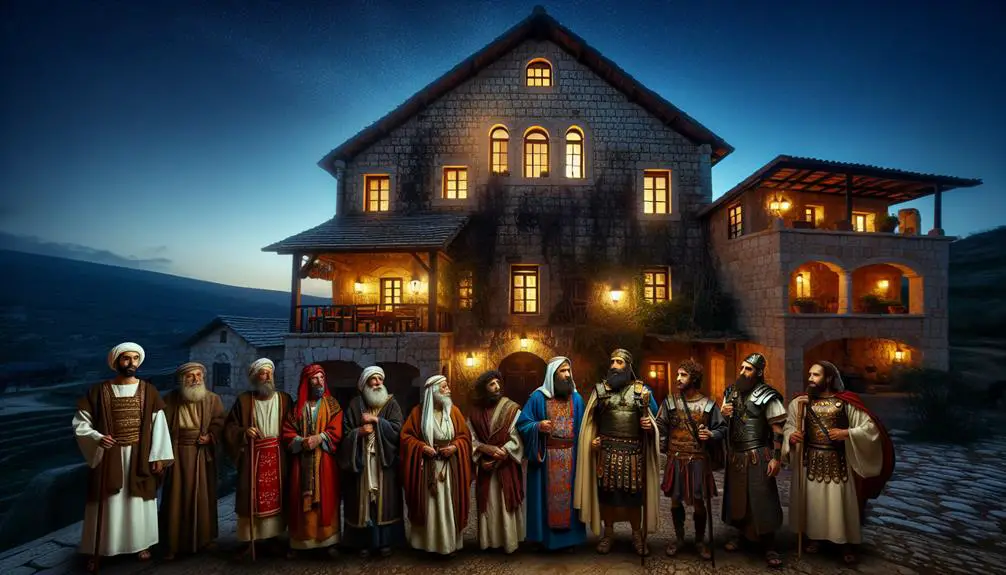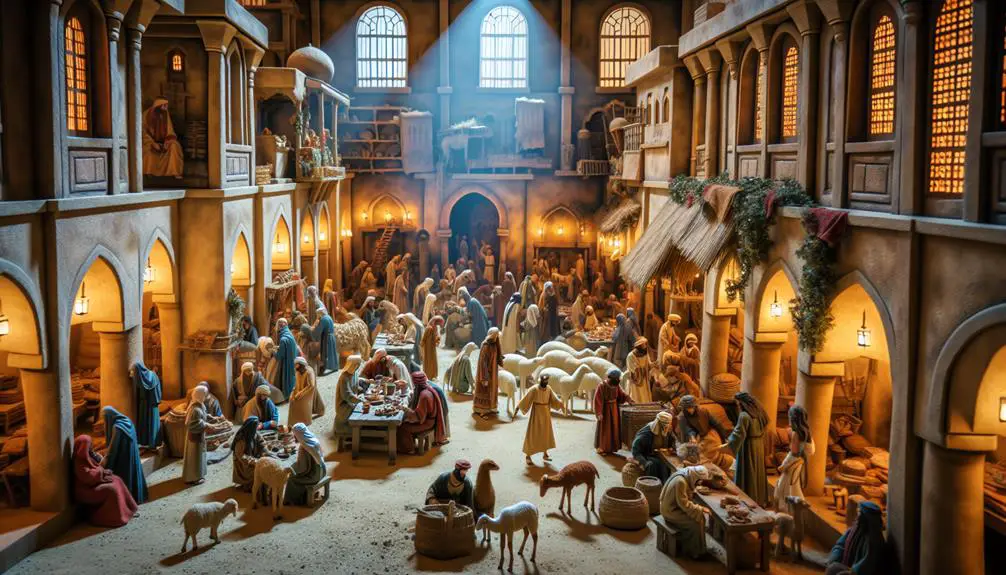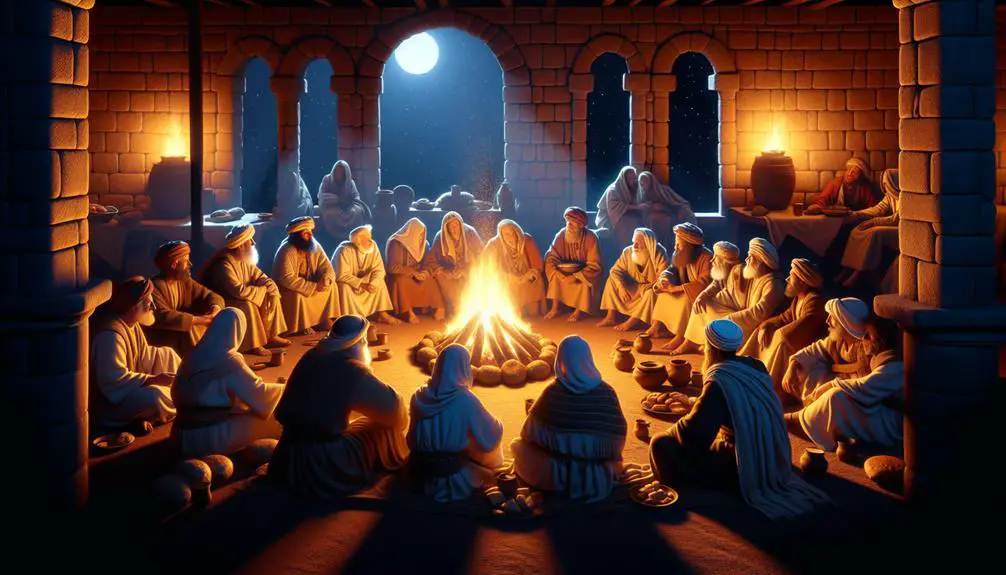Uncover the pivotal role of inns in biblical narratives, revealing a deeper understanding of hospitality and history in ancient texts.

Inn in the Bible
Isn't it curious that whenever you hear the word 'inn,' your mind might immediately leap to the biblical story of Mary and Joseph being turned away because there was no room? You've likely encountered the concept of hospitality in various forms, but the inns mentioned in the Bible offer a unique perspective on this age-old tradition.
Understanding the role these establishments played in biblical times could change how you view many well-known narratives. Let's explore the historical contexts, the events that unfolded within these walls, and their lasting cultural impact, leaving you with a fresh lens through which to view these ancient texts.
Key Takeaways
- Biblical inns were central to hospitality, serving as settings for moral lessons and divine encounters.
- Inns in the Bible symbolized care for strangers, emphasizing hospitality as a moral virtue.
- Architectural and societal roles of inns in biblical times reflect ancient travel and commerce practices.
- Misinterpretations of biblical inns can lead to romanticized views, obscuring their historical and cultural significance.
Historical Context of Inns

In examining the historical context of inns in biblical times, it's essential to recognize that these establishments served not only as places of lodging but also as vital hubs of commerce and social interaction. The architectural features of these inns were meticulously designed to accommodate the multifaceted needs of their diverse clientele. You'd find that the layout often included a central courtyard, which served as a communal gathering space. This design facilitated both the social and commercial interactions that were pivotal in these ancient communities.
Innkeeping practices of the time were equally noteworthy. Innkeepers were tasked with more than just providing a bed for the night; they were central figures in ensuring the safety, comfort, and even the sustenance of their guests. The provision of food and drink, often included in the cost of lodging, required a complex understanding of supply chains and local resources. This aspect of innkeeping underscores the role of inns as crucial nodes in the broader economic and social networks of the time.
Through this lens, it's clear that inns in biblical times were much more than mere places of rest. They were essential components of the social fabric, embodying the interconnectedness of commerce, community, and hospitality.
Inns in Biblical Narratives

Throughout biblical narratives, inns play pivotal roles, often serving as settings where significant events unfold and illustrating the societal norms and values of the times. These locations aren't merely backdrops but are critical to understanding the cultural and social dynamics of the era. Through inn descriptions and inn locations, one can glean insights into the hospitality customs, economic conditions, and travel practices of ancient societies.
Here are three key aspects to consider:
- Inn Descriptions: The Bible offers sparse yet significant descriptions of inns, emphasizing their function over luxury. These descriptions reflect the modest accommodations available to travelers, often highlighting the inn's role as a place of rest and refuge.
- Inn Locations: Situated along trade routes and pilgrimage paths, inns in biblical narratives are strategically placed. Their locations reveal the interconnectedness of ancient communities and the importance of travel in religious and commercial life.
- Cultural Significance: Inns in the Bible aren't merely physical locations but symbolic spaces where hospitality, morality, and divine intervention intersect. They serve as stages for narratives that reveal deeper truths about human nature and divine providence.
Analyzing inns in biblical narratives offers a window into the everyday lives of ancient peoples, their journeys, and their encounters at these crossroads of culture and commerce.
The Significance of Hospitality

Hospitality, deeply rooted in biblical traditions, serves as a potent symbol of community and divine grace, reflecting broader societal values and moral obligations. This ethos, emphasizing the care for strangers and the less fortunate, transcends mere acts of kindness, embodying a profound spiritual and ethical mandate. It's a principle that challenges you to recognize the divine in every guest, extending beyond the confines of personal comfort or societal norms.
In considering modern parallels, it's evident that this ancient virtue calls for a reevaluation of contemporary hospitality practices. Today's fast-paced, often impersonal society can overlook the significance of genuine connection and care for others, especially those outside one's immediate circle. The biblical emphasis on hospitality invites you to ponder ethical considerations in your interactions, urging a return to more intentional and compassionate engagement with others.
This reflection isn't just about how you host or treat guests but also how you integrate hospitality into daily living, advocating for a community that prioritizes support, generosity, and empathy. By drawing on these timeless principles, you're encouraged to foster environments where hospitality transcends mere obligation, becoming a way of life that enriches both giver and receiver.
Key Biblical Events at Inns

Several biblical narratives feature inns as pivotal settings where crucial events unfold, revealing much about the societal norms and spiritual lessons of the time. These establishments served not only as places of rest but also as venues where the divine intersected with the mundane, often through roadside encounters and acts of traveler aid. Here's an analytical look at three key events:
- The Good Samaritan: This parable epitomizes the virtue of compassion through the act of a Samaritan who aids a beaten man, taking him to an inn and ensuring his care. This event underscores the inn's role as a refuge and a place where mercy transcends societal boundaries.
- The Birth of Jesus: Although not directly mentioned, the concept of an inn is central to the nativity story. Mary and Joseph's search for lodging culminates in a manger due to the inn's full capacity, illustrating the humility of Christ's birth and the inn's symbolic exclusion of the Savior.
- The Escape to Egypt: Joseph is warned in a dream to flee to Egypt with Mary and Jesus, likely staying in inns during their journey. This highlights the inn as a haven for travelers, providing necessary aid amidst perilous times.
These narratives illustrate how inns facilitated essential interactions, serving both physical and spiritual needs, and played a significant role in biblical history.
Cultural Impact of Biblical Inns

How have inns depicted in biblical narratives influenced our cultural understanding of hospitality and sanctuary? The portrayal of inns within these ancient texts has significantly shaped our modern perceptions, often leading to misconceptions about their historical reality. These narratives have embedded a deep sense of hospitality as a sacred duty, reflecting the societal norms of ancient times but also influencing contemporary expectations of welcoming strangers.
The architectural evolution of inns from simple resting places to more complex accommodations mirrors the changing dynamics of travel and interaction in ancient societies. This evolution isn't just a matter of physical structures but also reflects a shift in social values and attitudes towards hospitality and community support. The biblical inn, often perceived as a humble, welcoming space, encourages a reassessment of our modern hospitality industry's priorities and practices.
Modern misconceptions about biblical inns, fueled by translations and interpretations, have led to a romanticized view of these establishments. This skewed perception overlooks the practical and social complexities of ancient hospitality, reducing it to simplistic narratives. By understanding the cultural and historical contexts of biblical inns, you gain insight into the foundational values of hospitality and sanctuary that continue to resonate in today's society.
Frequently Asked Questions
How Do Modern Archaeological Findings Correlate With the Descriptions of Inns in the Bible?
You're exploring how archaeological discoveries match up with ancient lodging descriptions. These findings reveal insights into traveler demographics and the construction materials used.
By analyzing remnants, experts can deduce who stayed at these sites, ranging from merchants to pilgrims, and the materials—stone, wood, clay—tell us about the era's architectural practices.
This analysis offers a scholarly, contextual look at historical travel accommodations, bridging past narratives with tangible evidence.
Are There Specific Dietary or Cleanliness Rituals Associated With Guests Staying at Inns Mentioned in Biblical Times?
You're navigating the Airbnb of biblical times, curious about guest demographics and room allocation.
Surprisingly, specific dietary or cleanliness rituals for guests aren't explicitly mentioned. The ancient texts focus more on the hospitality offered rather than the nitty-gritty of guest rituals.
Analyzing these texts, it's clear that the emphasis was on providing shelter and sustenance, reflecting a broader, more inclusive approach to welcoming travelers, regardless of their backgrounds or needs.
How Did the Concept of Inns in the Bible Influence the Development of Hospitality Industries in Later Civilizations?
When exploring how early lodging concepts influenced modern hospitality, it's clear that historical inns set a foundation for prioritizing traveler's safety and understanding the economic impact of accommodating guests. These establishments were pivotal in shaping an industry focused on service, security, and economic growth.
Through offering a safe haven for travelers, they underscored the importance of hospitality, laying the groundwork for the expansive industry we witness today.
Can We Find Any Parallels Between the Depiction of Inns in the Bible and Inns or Hospitality Practices in Other Ancient Cultures Outside of the Biblical Context?
Interestingly, you'll find that many ancient cultures shared similarities in hospitality practices, hinting at early cultural exchanges.
When comparing these traditions, it's evident that parallels exist, particularly in the architectural styles and purposes of inns across different societies.
This comparison not only enriches our understanding of ancient hospitality but also highlights the interconnectedness of human societies, long before the concept of globalization.
It's a fascinating glimpse into the past, revealing more common ground than differences.
How Have Contemporary Interpretations and Portrayals of Inns From the Bible Evolved in Literature, Art, and Film?
You're exploring how modern adaptations in literature, art, and film have evolved the portrayal of inns. Inn symbolism now often reflects broader themes of hospitality, exclusion, or refuge, diverging from historical or biblical contexts. Narrative adaptations have creatively reimagined these spaces, sometimes shifting their significance or the stories they tell.
This evolution demonstrates how contemporary creators interpret and integrate traditional motifs into new, contextually rich narratives.
Conclusion
In sum, you've traveled through the historical pathways of inns within the biblical narrative, uncovering their pivotal role in fostering hospitality. These establishments weren't just backdrops but active participants in key events, reflecting a culture where 'a stranger is just a friend you haven't met.'
This exploration underscores the profound cultural impact of biblical inns, revealing how they've shaped notions of hospitality and community. Indeed, they serve as timeless reminders that hospitality isn't merely an act but a way of life.



Sign up